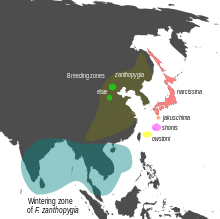白眉鶲
| 白眉鶲 | |
|---|---|

| |
| 成年雄鳥 | |

| |
| 成年雌鳥 (蒙古) | |
| 科學分類 | |
| 界: | 動物界 Animalia |
| 門: | 脊索動物門 Chordata |
| 綱: | 鳥綱 Aves |
| 目: | 雀形目 Passeriformes |
| 科: | 鶲科 Muscicapidae |
| 屬: | 姬鶲屬 Ficedula |
| 種: | 白眉鶲 F. zanthopygia
|
| 二名法 | |
| Ficedula zanthopygia (Hay)[2]
| |

| |
| 藍色為繁殖區 | |
| 異名 | |
|
Xanthopygia tricolor (Hartlaub, 1845) | |
白眉鶲(學名:Ficedula zanthopygia)又名白眉姬鶲,為鶲科姬鶲屬的鳥類。在中國大陸,分布於華北和華南等地。該物種的模式產地在馬來西亞。[2]該物種外形非常獨特,幾乎沒有與其相似的鳥類,唯一的例外是黃眉黃鶲。
描述
[編輯]雄鳥:體小(13厘米)的黃、白及黑色的鶲。腰、喉、胸及上腹黃色,下腹、尾下覆羽白色,其餘黑色,僅眉線及翼斑白色。雌鳥:上體暗褐,下體色較淡,腰暗黃。雄鳥白色眉紋和黑色背部及雌鳥的黃色腰各有別於黃眉[姬]鶲的雄雌兩性。虹膜-褐色;嘴-黑色;腳-黑色。
叫聲
[編輯]深喘息聲tr-r-r-rt,較紅頭姬鶲音低。
識別
[編輯]所有羽色階段的黃臀都非常明顯。雄鳥的白色眉紋使其與黃眉黃鶲和中華藍仙鶲區別開來。雌鳥與第一年的雄鳥背部為橄欖灰色,尾巴呈黑色。[3]恩斯特·哈特特(1910年)將該物種歸為narcissina群的一員。[4][5] 有些具有黃色眉紋的個體被認為是與黃眉黃鶲的雜交種。[6] 在這個物種複合群中,艾莉斯鶲("Elise's flycatcher" 通常被視為黃眉鶲的亞種)也包括在內。綠背姬鶲(elisae)和白眉鶲( zanthopygia)曾被觀察到在北京附近的橡樹林中分別繁殖,進一步證實了它們的獨特性。[7] 這兩者之間的鳴聲聲和形態也有明顯差異。[8][9]
鶲屬(Muscicapa)曾被認為是多系群,目前仍在進行解析,[10] 而姬鶲屬(Ficedula)如今被視為單系群,起源於東亞,並在上新世氣候變遷後分化。[11][12] 雄鳥上半身為黑色,具有白色眉紋和翅膀斑紋,腹部和臀部呈亮黃色。雌鳥背部為灰色或橄欖綠色,下半身較淺,具有翅膀條紋和黃色臀部,喉部可能呈黃色。[13]
生態
[編輯]
| |||||||||||||||||||||||||||||||||||||||||||||||||||
| 與其他物種的關係 |
該物種的繁殖地區位於滿洲、韓國和中國。牠們主要在5月至6月於小興安嶺地區築巢,繁殖地主要位於山腳低谷地區。每對鳥的領域範圍約為2000-5000平方米。巢由雌鳥單獨在三到四天內構成。巢卵數量為4-7枚,孵化工作由雌鳥單獨進行,持續約11-12天。成鳥會在巢周圍約70公尺(230英尺)範圍內覓食來餵養幼鳥。幼鳥在14-15天後羽翼豐滿。[14][15] 自1989年首次在印度中部記錄到該物種越冬,後來發現其也在印度西南部和斯里蘭卡越冬。[16][17]
一種寄生在白眉鶲身上的羽蟎Proterothrix megacaula,首次在中國被發現並描述。[18]
分布範圍
[編輯]白眉鶲主要繁殖於東亞地區,包括蒙古、外貝加爾、華南、韓國和日本西部,冬季則遷徙至中國南方、東南亞、大巽他群島、馬來半島和南亞的部分地區。
分布狀況
[編輯]繁殖於中國東北、華中、華東及北緯29°以北地帶。遷徙經中國南方。甚常見,高可至海拔1000米。
習性
[編輯]喜灌叢及近水林地。
俗名
[編輯]花頭黃、黃鶲、三色鶲、鴨蛋黃。[19]
參考文獻
[編輯]- ^ Ficedula zanthopygia. The IUCN Red List of Threatened Species 2012. [26 November 2013].
- ^ 2.0 2.1 中國科學院動物研究所. 白眉姬鶲. 《中國動物物種編目資料庫》. 中國科學院微生物研究所. [2009-04-04]. (原始內容存檔於2016-03-05).
- ^ Rasmussen, PC & JC Anderton. Birds of South Asia: The Ripley Guide. 2. Smithsonian Institution and Lynx Edicions. 2005: 375.
- ^ Hartert, E. Die Vögel der paläarktischen Fauna. 1. Friedlander und Sohn, Berlin. 1910: 490.
- ^ Dekker, R.W.R.J.; E.C. Dickinson & Hiroyuki Morioka. Systematic notes on Asian birds. 18. Some nomenclatural issues relating to Japanese taxa described in the Planches Coloriées (1820-1839) and Fauna Japonica, Aves (1844-1850). (PDF). Zool. Verh. Leiden. 2001, 335: 99–214.
- ^ McCarthy, Eugene M. Handbook of Avian Hybrids of the World.. Oxford University Press US. 2006: 242. ISBN 0-19-518323-1.
- ^ Weigold, H. Muscicapa elisae n. sp.. Falco. 1922, 18 (1): 1–2.
- ^ Zhang, Y.-Y.; N. Wang; J. Zhang & G.-M. Zheng. Acoustic difference of narcissus flycatcher complex.. Acta Zool. Sinica. 2006, 52 (4): 648–654.
- ^ Töpfer, T. Systematic notes on Asian birds. 60. Remarks on the systematic position of Ficedula elisae (Weigold, 1922). Zool. Med. Leiden. 2006, 80–5 (12): 203–212.
- ^ Lei Xin; Lian Zhen-Min; Lei Fu-Min; Yin Zuo-Hua; Zhao Hong-Feng. Phylogeny of some Muscicapinae birds based on cyt b mitochondrial gene sequences (PDF). Acta Zoologica Sinica. 2007, 53 (1): 95.
- ^ Outlaw DC, Voelker G. Systematics of Ficedula flycatchers (Muscicapidae): a molecular reassessment of a taxonomic enigma. (PDF). Mol Phylogenet Evol. 2006, 41 (1): 118–26. PMID 16797192. doi:10.1016/j.ympev.2006.05.004.
- ^ Outlaw DC, Voelker G. Pliocene climatic change in insular Southeast Asia as an engine of diversification in Ficedula flycatchers.. Journal of Biogeography. 2008, 35 (4): 739. Bibcode:2008JBiog..35..739O. S2CID 44229873. doi:10.1111/j.1365-2699.2007.01821.x.
- ^ Woo-Shin Lee, Tae-Hoe Koo, Jin-Young Park (2005). A field guide to the birds of Korea. p. 248. ISBN 978-8995141533.
- ^ Liu, Y; Wang, J. Studies on the Breeding Behaviour of the Tricolar Flycatcher. Acta Zool. Sin. 1981, 27 (3): 287–291.
- ^ Wang, N; Yanyun Zhang & Guangmei Zheng. Home ranges and habitat vegetation characters in breeding season of Narcissus Flycatcher and Yellow-rumped Flycatcher. Frontiers of Biology in China. 2007, 2 (3): 345–350. S2CID 36869931. doi:10.1007/s11515-007-0051-1.
- ^ Haribal, Meena. Yellow-rumped Flycatcher M. zanthopygia: a new addition to the avifauna of the Indian subcontinent.. J. Bombay Nat. Hist. Soc. 1992, 88 (3): 456–458.
- ^ Holt, Paul I. Yellow-rumped flycatcher Ficedula zanthopygia in Kerala.. J. Bombay Nat. Hist. Soc. 2003, 100 (1): 145.
- ^ Mironov, S. V.; W. Diao; Y. Zhang; C. Zhang & Zh. Yan. A new feather mite species of the genus Proterothrix Gaud (Astigmatea, Proctophyllodidae) from Ficedula zanthopygia (Hay) (Passeriformes: Muscicapidae) in China.. Acarina. 2008, 16 (1): 31–38.
- ^ Ramsay., MacKinnon, John; Fen-qi., He,. Zhongguo niao lei ye wai shou ce. 中国鸟类野外手册 Di 1 ban. Changsha Shi: Hunan jiao yu chu ban she. 2000. ISBN 9787535532244. OCLC 48267025.
- ^ 馬敬能, 約翰; 菲利普斯; 何芬奇. 中国鸟类野外手册. 長沙: 湖南教育出版社. 2000: 282. ISBN 978-7-5355-3224-4.



